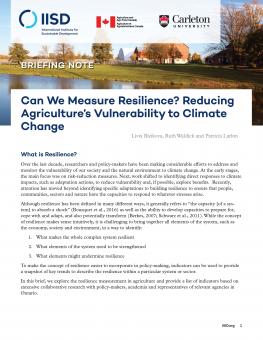
Can We Measure Resilience? Reducing Agriculture’s Vulnerability to Climate Change
Thirty-six indicators make up this framework to promote resilience to climate change impacts and vulnerabilities in Canadian agriculture.
Over the last decade, researchers and policy-makers have been making considerable efforts to address and monitor the vulnerability of our society and the natural environment to climate change.
Recently, attention has moved beyond identifying specific adaptations to building resilience to ensure that people, communities, sectors and nature have the capacities to respond to whatever stresses arise. A framework was developed based on input from over 100 experts representing local, provincial and federal government, as well as non-governmental agencies in agriculture, environment, rural development and health to identify potential impacts of concern. Thirty-six indicators were identified within six themes: climate change, population, farmland production activities, market and economy, rural infrastructure and natural environment. Indicators were advanced from the more traditional measures of the environment or society—like number of hot days or average rainfall and number of people employed in agriculture—to create regionally meaningful changes in the timing, extent or features of impacts or outcomes.
Participating experts
You might also be interested in
Good COP? Bad COP?: Food systems at COP29
The 29th United Nations Climate Conference (COP 29) in Baku failed to build on the notable progress made on food systems at COP 28. However, it wasn't all doom and gloom.
What Will Happen at COP 29?
Talks at the 2024 UN Climate Change Conference (COP 29) will range from defining a way forward on finance through a new collective quantified goal (NCQG) to mitigation, and loss and damage. Ahead of negotiations in Baku, IISD’s Earth Negotiations Bulletin Team Lead Jennifer Bansard examines the agenda and breaks down what to watch as eyes turn to Azerbaijan.
IISD Annual Report 2023–2024
While IISD's reputation as a convenor, a trusted thought leader, and a go-to source on key issues within the sustainable development field is stronger than ever, the work happening outside the spotlight is just as valuable.
Unlocking Clean Power for All
This report uses tipping point theory to advise where public funding can be strategically directed to catalyze renewable energy deployment in developing and emerging economies.